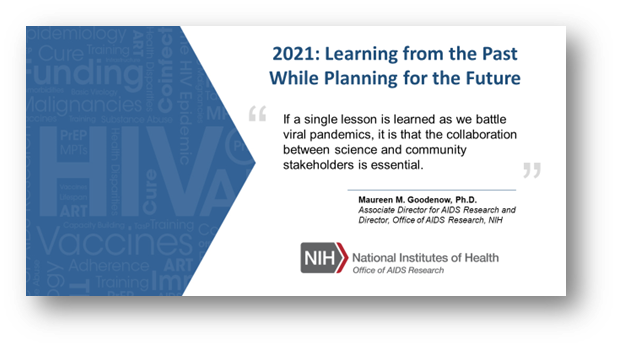Learning from the Past While Planning for the Future
If a single lesson is learned as we battle viral pandemics, it is that the collaboration between science and community stakeholders is essential. This lesson has long been evident in the work of the Office of AIDS Research (OAR) and was especially obvious in 2020. Critical lessons learned from the 40-year history of HIV research were able to accelerate the extraordinary response to the COVID-19 pandemic. Partnerships among the public sector, academia, the private sector, and community accelerated scientific discovery to successfully develop two vaccines in a year like no other.
Dr. Anthony S. Fauci and I reflected on 2020 accomplishments, plans, and challenges in our joint National Institutes of Health (NIH) Statement on World AIDS Day 2020, including the resilience and collaborations that enabled tremendous HIV research progress despite the COVID-19 pandemic. From the NIH commitment of $6 million dollars to the Centers for AIDS Research for Ending the HIV Epidemic: A Plan for America (EHE), to the early favorable conclusions of the HPTN 083 and HPTN 084 trials demonstrating the safety and effectiveness of long-acting injectable pre-exposure prophylaxis (PrEP), 2020 brought some optimism and progress even among the excessive morbidity and mortality of COVID-19 worldwide.
As we embark on 2021, the OAR is committed to strengthen and advance HIV research at the NIH. The OAR’s mission is to ensure that NIH HIV/AIDS research funding is directed at the highest priority research areas and to facilitate maximal return on the investment. The office was established in 1988 through Section 2353 of the Public Health Service Act to provide leadership in setting the national and global HIV/AIDS research agenda, to identify and establish research priorities and emerging needs, and to develop the NIH Strategic Plan for HIV and HIV-Related Research (The Strategic Plan). The Strategic Plan serves as the guiding framework for the OAR to allocate funds to the NIH Institutes, Centers, and Offices that advance the NIH-wide research agenda and ensure investment of resources in the highest priority areas of scientific opportunity.
In 2020, the OAR developed the first 5-year Strategic Plan, covering fiscal years 2021–2025, to accommodate a longer-term vision and to better address the natural progress of research than the previous 2-year plans. The plan builds upon scientific progress and opportunities for advancing HIV/AIDS research toward an end to the pandemic and has a 5-year cycle that aligns with major domestic and international HIV strategies.
The OAR is already engaged in implementing the 2021 agenda for NIH HIV research that includes—
- Engage EHE stakeholders and communities and pursue a robust and responsive EHE portfolio;
- Develop the annual Professional Judgment Budget;
- Provide guidance for the Congressional Justification Budget documents;
- Execute the HIV budget process;
- Analyze NIH HIV research investments to determine funding trends, alignment with current priorities, and opportunities for collaboration and synergies across NIH;
- Provide resources for novel and innovative HIV research, including expansion of the pool of multidisciplinary and diverse early-stage HIV researchers;
- Continue engagement with extramural and intramural stakeholders through the Office of AIDS Research Advisory Council, the NIH HIV/AIDS Executive Committee, Listening Sessions, and interaction with community, investigators, and advocacy groups;
- Disseminate the OAR HIV Stakeholder Outreach and Engagement Report;
- Develop a framework to accelerate HIV research with lessons learned from COVID strategies and programs; and
- Use data analytics to identify priority research areas.
We are at a pivotal time for HIV research. The tools to end the HIV pandemic are within our grasp and the path has been paved for promising scientific discovery in the new year. Valuable lessons from the COVID-19 pandemic—including the accelerated widespread use of telemedicine and mHealth technologies, point-of-care and home-based testing products, renewal of clinical trial network funding, and development of novel diagnostic platforms—have opened the door for new progress with HIV. The OAR looks forward to continuing the momentum as we work collaboratively to end the HIV pandemic.
To learn more about the OAR and how it catalyzes the NIH HIV/AIDS research investment, please visit the OAR website and see the HIV Policy and Research and NIH HIV Research Program sections.
Maureen M. Goodenow, Ph.D.
Associate Director for AIDS Research and
Director, Office of AIDS Research
National Institutes of Health
This page last reviewed on December 10, 2024


